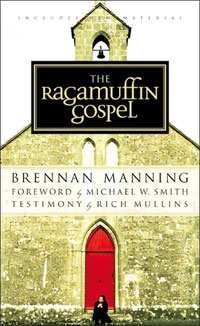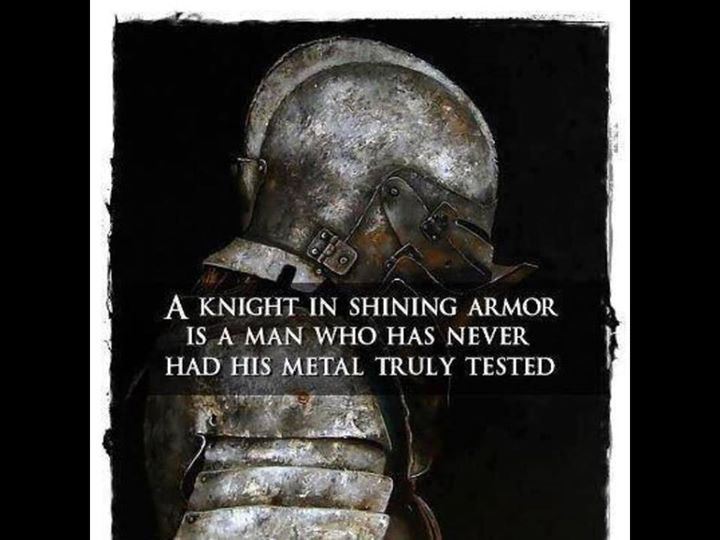
“Tough love is a love that won’t let go. Sometimes, it has to be ‘velvet on an iron fist’. It is caring enough not to be manipulated or controlled. The truth must be spoken— and spoken in love.”
This post is a bit long, but amazing.
The Ragamuffin Gospel, by Brennan Manning. Here’s an excerpt of Chapter 7
One of my indelible memories goes back to April 1975 when I was a patient at an alcoholic rehabilitation center in a small town north of Minneapolis . The setting was a large, split-level recreation room on the brow of a hill overlooking an artificial lake. Twenty-five chemically dependent men were assembled. Our leader was a trained counselor, skilled therapist, and senior member of the staff. His name was Sean Murphy-O’Connor, though he normally announced his arrival with the statement: “It’s himself. Let’s get to work.”
Sean directed a patient named Max to sit on “the hot seat” in the center of the U-shaped group. A small, diminutive man, Max was a nominal Christian, married with five children, owner and president of his company, wealthy, affable, and gifted with remarkable poise.
“How long have you been drinking like a pig, Max?” Murphy-O’Connor had begun the interrogation.
Max winced. “That’s quite unfair.”
“We shall see. I want to get into your drinking history. How much booze per day?”
Max relit his corncob pipe. “I have two Marys with the men before lunch and twin Martins after the office closes at five. Then . . .”
“What are Marys and Martins?” Murphy-O’Connor interrupts.
“Bloody Marys–Vodka, tomato juice, a dash of lemon and Worcestershire, a splash of Tabasco; and Martinis, Beefeaters gin, extra dry, straight up, ice cold with an olive and lemon twist.”
“Thank you. Continue.”
“The wife likes a drink before dinner. I got her hooked on Martins several years ago. Of course she calls them ‘pre-prandials.’ ” Max smiled. “Of course you understand the euphemism. Isn’t that right, gentlemen?”
No one responded.
“As I was saying, we have two martinis before dinner and two more before going to bed.”
“A total of eight drinks a day, Max?” Murphy O’Connor inquired.
“Absolutely right. Not a drop more, not a drop less.”
“You’re a liar”‘
Unruffled, Max replied: “I’ll pretend I didn’t hear that. I have been in business for twenty-odd years and built my reputation on veracity not mendacity. People know my word is my bond.”
“Ever hide a bottle in your house?” asked Benjamin, a Navajo Indian from New Mexico .
“Don’t be ridiculous. I’ve got a bar in my living room as big as a horse’s ass. Nothing personal, Mr. Murphy-O’Connor.” Max felt he had regained control. He was smiling again.
“Do you keep any booze in the garage, Max?”
“Naturally. I have to replenish the stock. A man in my profession does a lot of entertaining at home.” The executive swagger had returned.
“How many bottles in the garage?”
“I really don’t know the actual count. Offhand, I would say two cases of Smirnoff Vodka, a case of Beefeater gin, a few bottles of bourbon and scotch, and a bevy of liquors.”
The interrogation continued for another twenty minutes. Max fudged and hedged, minimized, rationalized, and justified his drinking pattern. Finally, hemmed in by relentless cross-examination, he admitted he kept a bottle of vodka in the night stand, a bottle of gin in the suitcase for travel purpose, another in his bathroom cabinet for medicinal purposes, and three more at the office for entertaining clients. He squirmed occasionally but never lost his veneer of confidence.
Max grinned. “Gentlemen, I guess we have all gilded the lily once or twice in our lives,” was the way he put it, implying that only men of large mien can afford the luxury of self-deprecating humor.
“You’re a liar!” another voice boomed.
“No need to get vindictive, Charlie,” Max shot back. “Remember the image in John’s gospel about the speck in your brother’s eye and the two-by-four in your own. And the other one in Matthew about the pot calling the kettle black.”
(I felt constrained to inform Max that the speck and plank comparison were not found in John but in Matthew and the pot and the kettle was a secular proverb found in none of the gospels. But I sensed a spirit of smugness and an air of spiritual superiority had suddenly enveloped me like a thick fog. I decided to forego the opportunity for fraternal correction. After all, I was not at Hazelden doing research on a book. I was just another broken-down drunk like Max.)
“Get me a phone,” said Murphy-O’Connor.
A telephone was wheeled into the room. Murphy-O’Connor consulted a memo pad and dialed a number in a distant city. It was Max’s hometown. Our receiver was rigged electronically so that the party dialed could be heard loud and clear throughout the living room on the lake.
“Hank Shea?”
“Yeah, who’s this?”
“My name is Sean Murphy-O’Connor. I am a counselor at an alcohol and drug rehabilitation center in the Midwest . Do you remember a customer named Max? (Pause) Good. With his family’s permission I am researching his drinking history. You tend bar in that tavern every afternoon, so I am wondering if you could tell me approximately how much Max drinks each day?”
“I know Max well, but are you sure you have his permission to question me?”
“I have a signed affidavit. Shoot.”
“He’s a helluva guy. I really like him. He drops thirty bucks in here every afternoon. Max has his standard six martinis, buys a few drinks, and always leaves me a fin. Good man.”
Max leapt to his feet. Raising his right hand defiantly, he unleashed a stream of profanity worthy of a stevedore. He attacked Murphy-O’Connor’s ancestry, impugned Charlie’s legitimacy and the whole unit’s integrity. He clawed at the sofa and spat on the rug.
Then, in an incredible coup de main he immediately regained his composure. Max reseated himself and remarked matter-of-factly that even Jesus lost his temper in the temple when he saw the Sadducees hawking pigeons and pastries. After an extemporaneous homily to the group on justifiable anger, he stoved his pipe and presumed that the interrogation was over.
“Have you ever been unkind to one of your kids?” Fred asked.
“Glad you brought that up, Fred. I have a fantastic rapport with my four boys. Last Thanksgiving I took them on a fishing expedition to the Rockies . Four days of roughing it in the wilderness. A great time! Two of my sons graduated from Harvard, you know, and Max Jr. is in his third year at . . . “
“I didn’t ask you that. At least once in his life every father has been unkind to one of his kids. I’m sixty-two years old and I can vouch for it. Now give us one specific example.”
A long pause ensued. Finally, “Well, I was a little thoughtless with my nine-year-old daughter last Christmas Eve.”
“What happened?”
“I don’t remember. I just get this heavy feeling whenever I think about it.”
“Where did it happen? What were the circumstances?”
“Wait one minute!” Max’s voice rose in anger. “I told you I don’t remember. Just can’t shake this bad feeling.”
Unobtrusively, Murphy-O’Connor dialed Max’s hometown once more and spoke with his wife.
“Sean Murphy-O’Connor calling, ma’am. We are in the middle of a group therapy session, and your husband just told us that he was unkind to your daughter last Christmas Eve. Can you give me the details, please?”
A soft voice filled the room. “Yes, I can tell you the whole thing. It seems like it just happened yesterday. Our daughter Debbie wanted a pair of earth shoes for her Christmas present. On the afternoon of December 24, my husband drove her downtown, gave her sixty dollars, and told her to buy the best pair of shoes in the store. That is exactly what she did. When she climbed back into the pickup truck her father was driving, she kissed him on the cheek and told him he was the best daddy in the whole world. Max was preening himself like a peacock and decided to celebrate on the way home. He stopped at the Cork ‘n’ Bottle–that’s a tavern a few miles from our house and told Debbie he would be right out. It was a clear and extremely cold day, about twelve degrees above zero, so Max left the motor running and locked both doors from the outside so no one could get in. It was a little after three in the afternoon and . . .
Silence.
“Yes?”
The sound of heavy breathing crossed the recreation room. Her voice grew faint. She was crying. “My husband met some old Army buddies in the tavern. Swept up in euphoria over the reunion, he lost track of time, purpose, and everything else. He came out of the Cork ‘n’ Bottle at midnight . He was drunk. The motor had stopped running and the car windows were frozen shut. Debbie was badly frostbitten on both ears and on her fingers. When we got her to the hospital, the doctors had to operate. They amputated the thumb and forefinger on her right hand. She will be deaf for the rest of her life.”
Max appeared to be having a coronary.
He struggled to his feet making jerky, uncoordinated movements. His glasses flew to the right and his pipe to the left. He collapsed on all fours and sobbed hysterically.
Murphy-O’Connor stood up and said softly, “Let’s split.”
Twenty-four recovering alcoholics and addicts climbed the eight-step stairwell. We turned left, gathered along the railing on the upper split level and looked down. No man will ever forget what he saw that day, the twenty-fourth of April at exactly high noon. Max was still in the doggie position. His sobs had soared to shrieks. Murphy-O’Connor approached him, pressed his foot against Max’s rib cage and pushed. Max rolled over on his back.
“You unspeakable slime,” Murphy-O’Connor roared. “There’s the door on your right and the window on your left. Take whichever is fastest. Get out of here before I throw up. I am not running a rehab for liars!”
The philosophy of tough love is based on the conviction that no effective recovery can be initiated until a man admits that he is powerless over alcohol and that his life has become unmanageable. The alternative to confronting the truth is always some form of self-destruction. For Max there were three options: eventual insanity, premature death, or sobriety.
In order to free the captive, one must name the captivity.
Max’s denial had to be identified through merciless interaction with his peers. His self-deception had to be unmasked in its absurdity.
Later that same day Max pleaded for and obtained permission to continue treatment. He proceeded to undergo the most striking personality change I have ever witnessed. He got honest and became more open, sincere, vulnerable, and affectionate than any man in the group. Tough love had made him real and the truth had set him free.
The denouement to his story: The night before Max completed treatment, Fred passed by his room. The door was ajar. Max was sitting at his desk reading a novel entitled Watersbip Down. Fred knocked and entered. For several moments Max sat staring at the book. When he looked up, his cheeks were streaked with tears. “Fred, he said hoarsely, “I just prayed for the first time in my life.” Max was on the road to knowing God.
An intimate connection exists between the quest for honesty and a transparent personality. Max could not encounter the truth of the living God until he faced his alcoholism. From a biblical perspective, Max was a liar. In philosophy, the opposite of truth is error: in Scripture, the opposite of truth is a lie. Max’s lie consisted in appearing to be something he wasn’t–a social drinker. Truth for him meant acknowledging reality–his alcoholic drinking.
The Evil One is the great illusionist. He varnishes the truth and encourages dishonesty. “If we say we have no sin in us, we are deceiving ourselves and refusing to admit the truth” (1 John 1:8). Satan prompts us to give importance to what has no importance. He clothes trivia with glitter and seduces us away from what is real. He causes us to live in a world of delusion, unreality, and shadows.
The best thing I could do is to let Mr. Manning speak for himself. I hope it blesses, and perhaps you’ll purchase his book. I don’t think you will be disappointed.
No copyright infringement has been intended. It has been reprinted for ministry purposes only. If this small portion piques your interest, buy the book from your local bookstore. — Bryan













